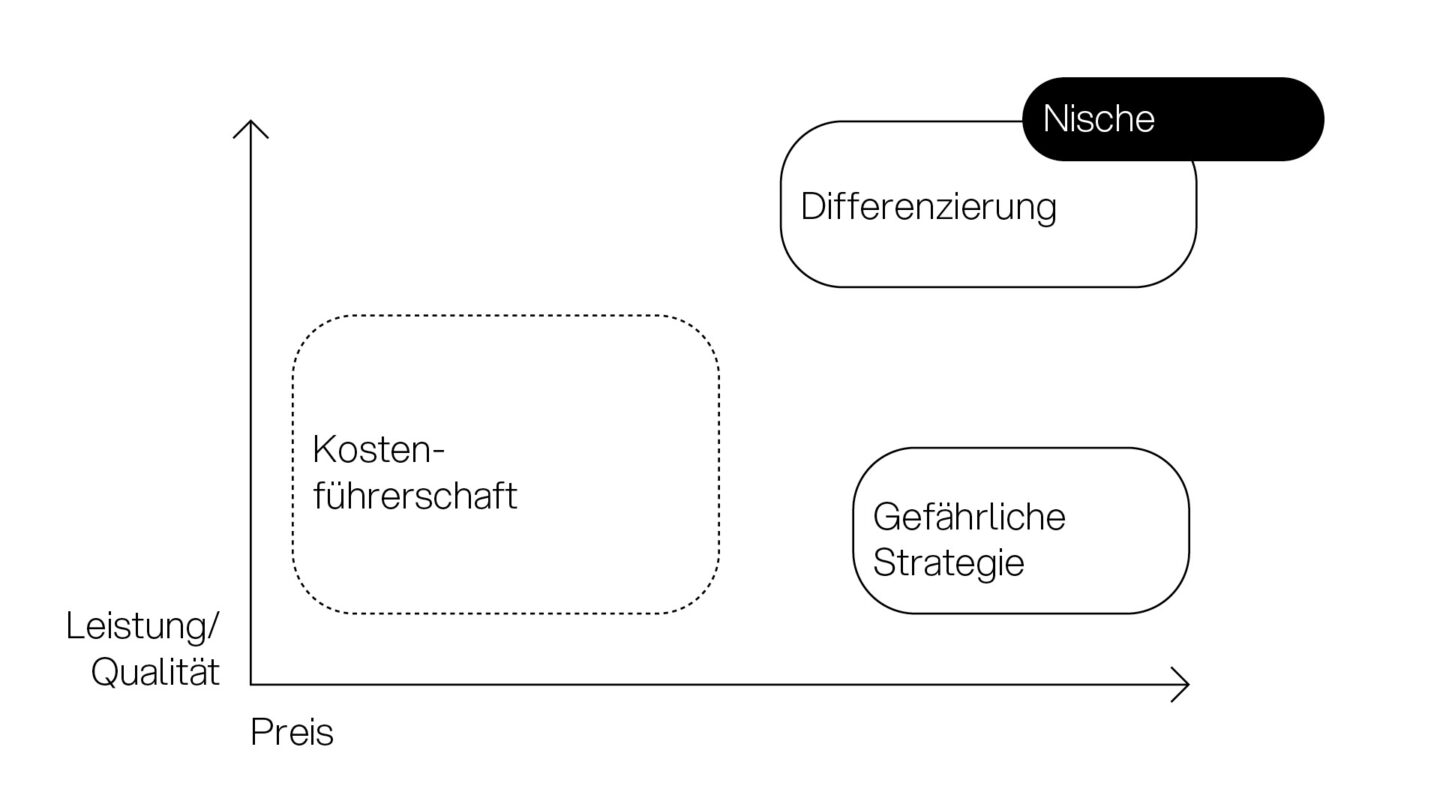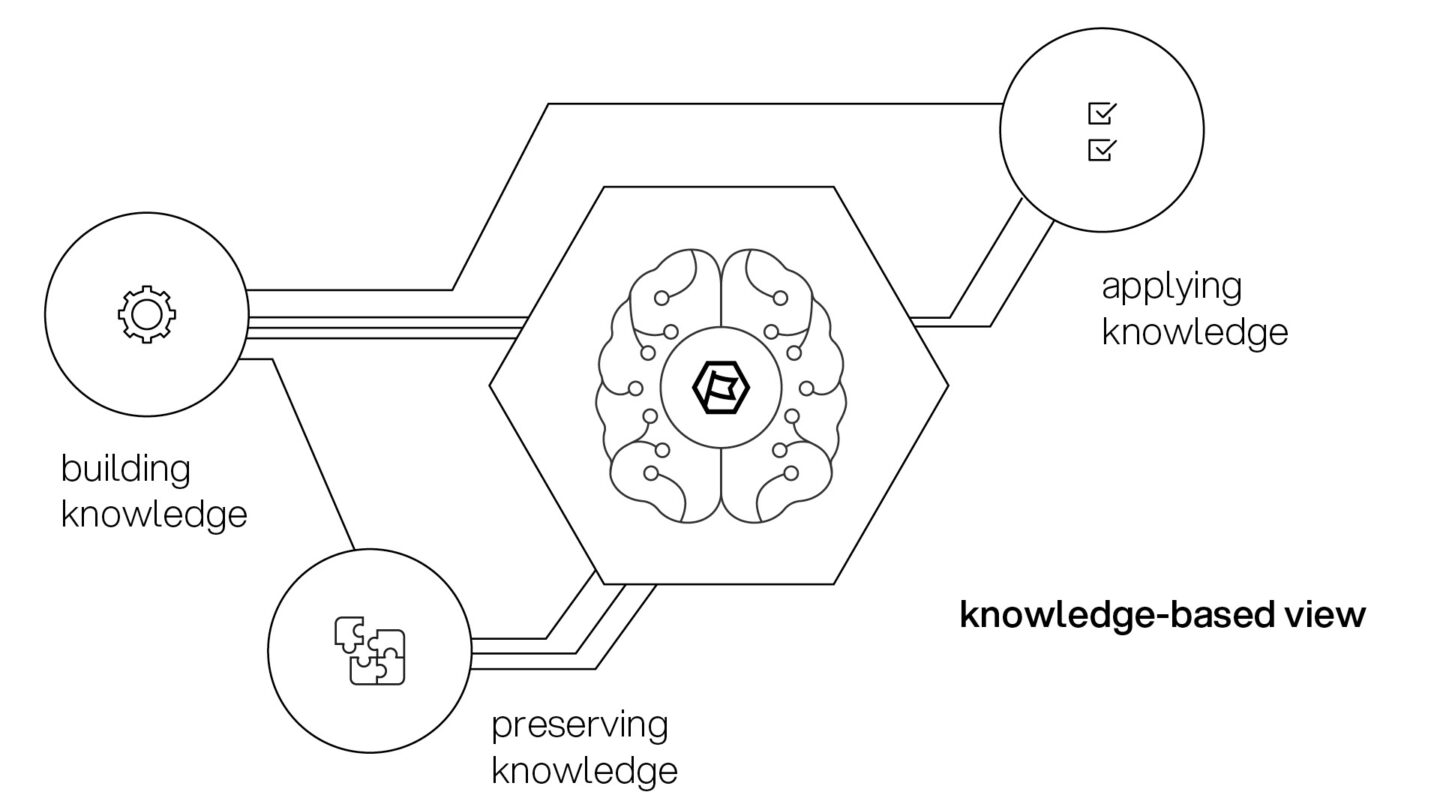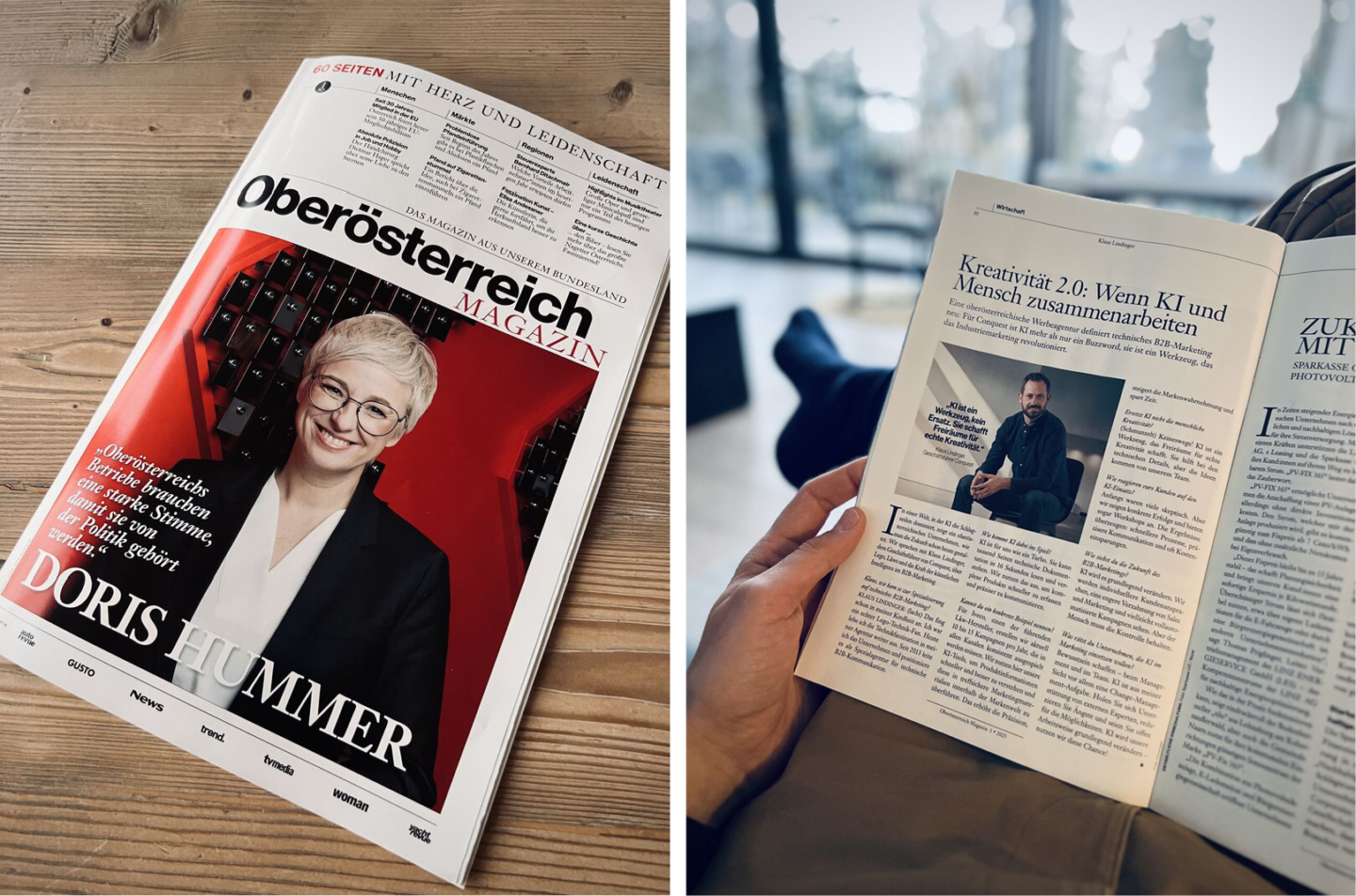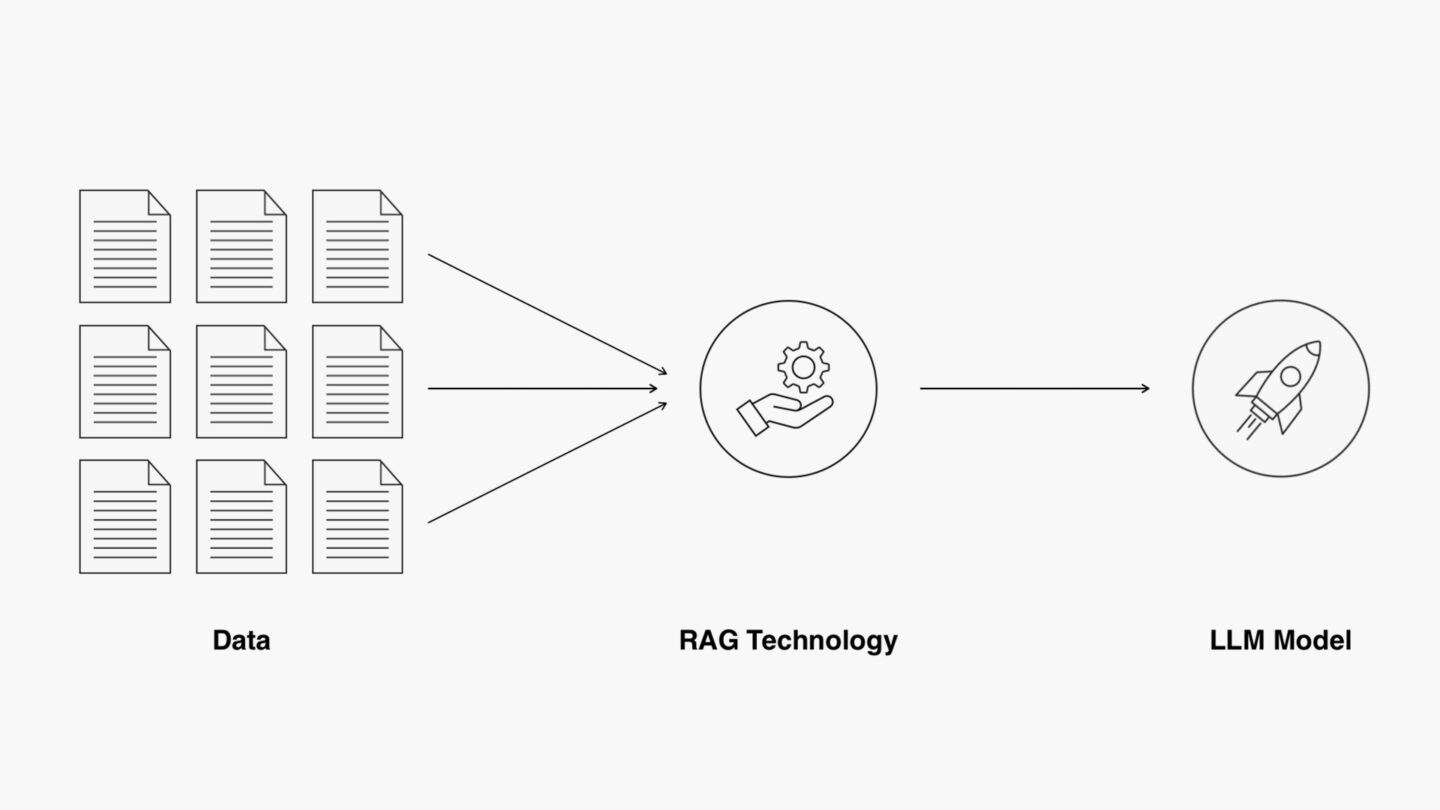Conquest Werbeagentur GmbH
Kürnbergblick 3
4060 Leonding
Conquest Werbeagentur GmbH
Kürnbergblick 3
4060 Leonding
When I walk through the city, it feels like there’s an ad agency on every corner. A quick google search confirms it: there are dozens nearby. But not all agencies are created equal: each one needs a niche.
Conquest’s position is clear. We are a technical B2B agency specializing in industrial customers. But what exactly does that mean?
We seek out customers from highly technical industries. We want to sell steel mills, injection molding machines and fire engines. The more complex the product, the better – we love understanding how things work. It’s that curiosity that lets us communicate the product’s advantages clearly and efficiently.
Perhaps most importantly, our account managers come from these industries themselves whenever possible. Who better to understand a new injection molding machine than an account manager who used to work for one of the biggest players on the global market? Years of experience in the metal processing industry are just as valuable to us as a degree in marketing when it comes to projects with customers in the metals industry. Thanks to this strategy, we have a head start in understanding our customer’s needs, no matter the project.
Engineers and purchasers are some of the most discerning (some might say picky) buyers in the market. They aren’t impressed by vague slogans and flashy visuals — they want clarity, precision, details. That’s why technical depth is more than a “nice to have” in this space. It’s essential.
We know how to ask the right questions, challenge unclear claims, and spot genuine innovation. This allows us to shape messaging that doesn’t just sound good — it is good. And that pays off. Campaigns rooted in substance perform better over time. They attract the right leads. They build trust faster. And they align your brand with expertise — not empty promises.
At Conquest, technical expertise goes hand-in-hand with creativity. That’s why we were among the first agencies in our region to fully embrace generative AI. That’s why our customers stay with us for years – sometimes decades. Technical expertise and creative expertise: the cornerstones of our success.
This niche is occupied :-).
"*" indicates required fields
Better to be relevant for a few than interchangeable for everyone
If you lose your way in marketing, you quickly end up with mediocrity. And let’s be honest: mediocrity has never inspired anyone. Especially in the B2B sector, where complex products and long decision-making processes are common, clarity is needed rather than a buffet-style mentality. Specialization means having a razor-sharp focus and, ultimately, attracting just those customers who really fit. Why less is sometimes more and which methods pave the way to specialization? Find out here.
Specialization in marketing is not a new trend, but a proven principle. Or as well-known marketeer Philip Kotler succintly puts it:
The key to success is not to be everything to everyone, but to be exactly right for your target group.
A look at the scientifically based STP model (Segmentation, Targeting, Positioning) shows why specialization is so crucial in marketing. This model describes the three central steps that companies use to hone their market strategy.
Segmentation means dividing the market into different customer groups with specific needs and characteristics. This is followed by targeting, in which the most attractive target group is selected from these groups – the one that best suits the company’s own brand, the solutions it offers and its corporate goals. The final step, positioning, ensures that the company is anchored in the minds of customers with a clear, differentiating benefit.
This targeted approach is essential, especially in the B2B sector with products that often require explanation and long sales cycles. Companies that focus their resources on a clearly defined target group can formulate their messages more precisely, deliver tailored content and establish themselves as a leading provider in their niche. Those who try to appeal to everyone, on the other hand, risk not really convincing anyone in the end.
Specialization in the B2B sector is not only a strategic advantage, but often a basic prerequisite for long-term success. While consumer goods brands can work with a broad target group, B2B companies are usually narrowed in on specific niches and complex supply chains. But why is this so crucial? A look at proven economic theories shows that specialization is far more than just a marketing strategy – it is a foundation for sustainable competitive advantage.
The economist Michael Porter contributed to the understanding of strategic differentiation with his Competitive Advantage Theory. According to Porter, companies can only secure long-term success in two ways: cost leadership or differentiation. While cost leadership aims to be the cheapest provider through economies of scale and efficient processes, differentiation is the ideal path. This involves setting yourself apart from the competition through unique features – such as specialized services, in-depth expertise or technological excellence. Those who focus on a clearly defined niche not only offer more relevant solutions, but can also command higher prices as the perceived value increases.

Another key concept is the knowledge-based view (KBV), a business perspective that views knowledge as a company’s most important strategic resource. Particularly in the B2B sector, where decision-making processes are often characterized by technical requirements, in-depth specialist knowledge is a decisive success factor. According to KBV, companies are more competitive if they build up, retain and make targeted use of specific knowledge. A company that deepens its expertise in a specific industry not only increases its credibility, but is also perceived as a preferred partner. This is because industrial customers do not expect generic advertising messages, but rather technically sound content that addresses their specific challenges.

In short: specialization in industrial marketing is not a trend, but a proven strategy for success. Those who position themselves as experts not only secure higher market shares, but also long-term trust – and that is exactly what makes the difference.
_Increased credibility
Specialization creates trust because expert knowledge is measurable.
_More effective customer retention
B2B decision-making processes are long-term – those who are specialized stay in the conversation.
_More innovation
In-depth market knowledge makes it possible to develop new solutions in a targeted manner.

Over 50 years of experience – that’s a long time to get to know markets, trends and customer needs. But experience alone is not enough when the world keeps turning. That is why we have asked ourselves a crucial question in the past months: Who do we really want to work for?
The first step was an honest stocktaking. We analyzed our existing customers and quickly realized that technical companies are our thing. Whether mechanical engineering, automation or industrial goods – this is where we feel at home.
Why? Because our employees are not only creative minds, but also have technical understanding. We are not put off by complex products – on the contrary, they motivate us.
But just having a soft spot for technology is not enough. We wanted to know: What is our competitive advantage? The answer was clear. Many agencies avoid industrial companies because the products are complex and require a deeper understanding.
We, on the other hand, see this as our strength. We understand technology – and know how to communicate it attractively. That is why we have decided to focus entirely on B2B companies.
With this realization, it was clear that our positioning had to be perfect. We are not an agency for everyone. We are the specialist agency for technical B2B communication.
Our promise? We make technical brands attractive and their marketing efficient.
Specialization is not a risk – it is the key to greater relevance, quality and success.
Those who dare not to be there for everyone become all the more valuable for the right customers.
"*" indicates required fields
This interview was first published in OÖ Magazin, issue 1/25.
An Upper Austrian advertising agency is redefining technical B2B marketing. For Conquest, AI is more than just a buzzword, it is a tool that is revolutionizing industrial marketing
In a world where AI dominates the headlines, an Upper Austrian company is showing how to shape the future today. We spoke to Klaus Lindinger, Managing Director of Conquest, about Lego, trucks and the power of AI in B2B marketing.
Klaus, how did you come to specialize in technical B2B marketing?
Klaus: (laughs) It all started in my childhood. I was a real Lego-Technik fan. Today, I live out this fascination in our family agency. I’ve been running the company since 2013 and we make technical brands attractive and their marketing efficient.
How does AI come into play?
Klaus: AI is like a turbocharger for us. It can read and understand a thousand pages of technical documentation in 16 seconds. We use it to understand complex products more quickly and communicate them more precisely.
Can you give a specific example?
Klaus: We currently create 10 to 15 campaigns per year for Iveco, one of the world’s leading truck manufacturers, which have to be played out consistently across all channels. We use our AI tools here to understand product information faster and better and translate it into accurate marketing materials. This increases precision and saves time.
Isn’t AI replacing human creativity?
Klaus: (smiles) Not at all! AI is a tool that creates scope for real creativity. It helps with the technical details, but the ideas come from our team.
How do your customers react to the use of AI?
Klaus: Many people were skeptical at first. But we are seeing concrete successes and even offer workshops. The results are convincing: faster processes, more precise communication and often cost savings.
How do you view the future of B2B marketing?
Klaus: AI will fundamentally change things. We will see more individualized customer approaches, closer integration of sales and marketing and perhaps fully automated campaigns. But humans must remain in control.
What advice do you have for companies that want to use AI in marketing?
Klaus: Creating awareness – among management and in the team. Above all, AI is a change management task. Get external support, reduce fears and be open to the possibilities. AI will fundamentally change the way we work – let’s seize this opportunity!

"*" indicates required fields
The world of marketing has changed enormously in recent years thanks to artificial intelligence. One click — and images, videos or texts are created that were not directly shaped by a human hand. However, as impressive as these technologies are, they raise a number of legal questions – especially when it comes to image and video rights. What does it mean to use AI-generated content in advertising? What are the legal pitfalls? And how do we deal with them as an agency? Let’s get to the bottom of these questions!
Who is the author of an image or video created by an AI? In Austria, the Copyright Act states that a work is only protected by copyright if it results from a personal intellectual creation (Section 1 (1) UrhG). Since AI usually generates an image without direct human input, the question arises: Who is the “mother” of the work? The answer is simple – no one. Because AI has no “intellectual” creator in the conventional sense.
For us as an advertising agency, this means that AI-generated content is generally not protected by copyright. At first glance, this sounds tempting – after all, it could mean that we can access such content at will. But this is only half the truth. The advantage is that AI-generated images and videos are basically free to use. But beware: there is still a catch.
While AI becomes “creative” by using existing works as training material, the danger of AI unintentionally replicating copyrighted elements creeps in. Imagine an AI creating an image that looks strikingly similar to a known photograph or artwork – without consciously replicating it. Even if the human influence is minimal, this could lead to copyright infringement, especially if the AI has been trained with copyrighted content.
Another risk is the infringement of trademark rights or personal rights, for example if the AI depicts well-known brand logos or celebrities in its images. As AI systems recognize and reproduce patterns, depictions of brands or people could be unintentionally created that are legally problematic.

With the introduction of the AI Act by the European Union, there are now clear rules for the use of artificial intelligence for the first time – including in the creative industry. This regulation is intended to ensure that AI technologies are used responsibly and do not pose any risks to fundamental rights, security or intellectual property. As an advertising agency, we have deliberately adapted our guidelines to this new legal framework in order to work not only creatively but also on the legal safe side.
Use as a tool, not as a replacement: AI is never the end product for us, but a creative tool. We rely on AI to gather inspiration and generate initial drafts, which we then refine with our own ideas and adaptations. This results in unmistakable designs that do not end up being “mainstream” but bear the unique signature of our agency.
Responsible choice of subject matter: We make sure that we work with universal and non-critical motifs – landscapes, abstract designs and atmospheric images are our preferred choice. We consciously avoid subjects that are subject to trademark or personal rights.
Transparency towards customers: When communicating with our customers, we value honesty and openness. We inform our partners about the extent to which AI-generated content is used so that everyone is in the picture and there are no surprises.
Ongoing training: As the legal landscape is constantly changing, regular training is essential for our team. The AI Act highlights the need to promote human-centric and trustworthy AI systems, which makes it all the more important for us to stay up to date. This is the only way we can make sure we offer our customers innovative and legally secure solutions.
AI-generated images and videos offer us as an advertising agency exciting new opportunities – but also challenges. The legal gray area surrounding copyrights, personal rights and trademark rights is complex and requires a conscious, reflective approach. Through transparent communication, responsible selection and continuous training, we can ensure that our clients receive not only creative but also legally safe content.
"*" indicates required fields
Your company is launching a new product: customers are excited, rumors are flying, and the launch date is rapidly approaching. As the marketing manager in your organization, you need to organize the promotional material for this new product well ahead of time to accommodate the usual lead times associated with campaigns. But the product…is delayed. How are you going to manage photo and video shoots to provide material for the launch campaign?
It’s an incredibly common situation. With modern just-in-time production, a small hiccup (not to mention a huge breakdown like the Covid supply chain crash) can lead to delays in getting the first units of your new product ready for their close-up. But the marketing material needs to get done anyway, so that promotion can begin.
Time and again we’ve supported our customers with amazing 3D rendered product stills and videos. We can use your existing CAD files to generate photorealistic images of your product before it has even left the assembly line. And our customers can sleep easy, knowing their engineering files are secure on our servers.
Even if product availability isn’t an issue, 3D rendering can be an economical alternative to complex on-location photo shoots. Instead of an entire team of photographers, assistants, product managers, models and makeup artists standing around unhappily in an unexpected cloudburst, our little cadre of experts can easily create images with the perfect lighting, background and angle, without sacrificing even one intern to the weather gods. Together with stock backgrounds or even AI generated environments, 3D images can look so real that even we have trouble telling them apart.
3D renderings and animations can be real show stoppers, letting your potential customers see a side of the product they’ve never seen before. How about showing your product from the inside? Or a cutaway image? Or a morph? Places and shots a real camera could never manage are a great opportunity for a rendered solution, especially when it comes to complex industrial facilities and machines.
An often overlooked advantage of having an in-house rendering office is the ability to try out designs before committing. What would the trade fair booth look like if we mirrored the layout? Is this demo design really going to look good on the firetruck? Where words fail, a simple rendered mockup can often help sell a concept, especially one that needs to run the gauntlet of unimaginative higher-ups.
"*" indicates required fields
Imagine if artificial intelligence wasn’t just another buzzword in your meetings, but the coolest toy you’ve ever gotten your hands on. Sounds crazy? Maybe. But that’s exactly how we initially viewed the new technology. After all, we knew that it would change our everyday lives, whether we wanted
to or not.
The journey from curiosity to innovation is like a rollercoaster ride – exciting, sometimes challenging, but so fascinating that you want to get back on again and again!
Do you remember the feeling when you started a new video game for the first time? That mixture of excitement and curiosity? That’s exactly the feeling we can use to bring AI into our companies!
The psychologist Mihaly Csikszentmihalyi called this “flow” – the state in which you are so absorbed that you forget time and space. Imagine if all your employees and colleagues worked on projects like this!
But wait a minute, isn’t it all a bit too playful for the serious business world? Not at all! Because this is precisely the key to the successful integration of new technologies.
_01 Reducing anxiety:
Players forget their fear of the unknown. AI suddenly turns from a threatening black box into an exciting field of discovery.
_02 Motivation boost:
Autonomy, competence and team spirit – the holy trinity of motivation according to Deci and Ryan – are promoted through playful learning. Employees become explorers who set themselves challenges and find solutions together.
_03 Innovation turboboost:
Play becomes serious, curiosity becomes innovation! When employees are free to experiment, the most creative ideas often emerge.
Imagine having a sandbox in the middle of your office. A place where you could build, experiment and even make mistakes – without consequences. This is exactly our approach to AI integration:
_Freedom to experiment:
No pressure, no inflated expectations. Just pure curiosity and the freedom to try out new things.
Error-friendly environment:
Oops, the AI spit out nonsense? No problem! This is how we learn the most.
Cross-team discovery:
When the accountant and the graphic designer work on prompts together, the most exciting ideas and lasting learning success are created.
But don’t worry, we won’t stay in the playground forever. After the initial experimentation phase, it’s time for the real challenges:
Application to real tasks: The AI skills acquired in the game are transferred to specific projects.
Quality assurance as a key competence: We have learned that trust is good, control is better. Yes, AI also makes mistakes! That’s why checking the AI results is the crucial final step.
Continuous learning: The AI world is constantly evolving – and we are evolving with it. Lifelong learning has never been more exciting!
By viewing AI as a fascinating toy, we turn potential resistance into enthusiasm and innovation. We create an environment in which employees enjoy experimenting, learning and growing – and become AI experts in the process. Even if things don’t always go smoothly, as can be the case with any experiment, we are certain: the journey from curiosity to innovation is like a rollercoaster ride – exciting, sometimes challenging, but so fascinating that you want to get back on again and again!
After our success, we thought: Why not share the fun? With the help of university professionals, we have further improved our AI Lab and now offer it to customers.
What can you expect in the AI Lab?
Interactive sessions:
Learn prompt engineering through fun tasks faster than your kids learn TikTok dances.
_Hands-on experience:
From simple prompts to complex AI processes – we take you by the hand and guide you step by step through the creation process
_Sustainable integration:
We will also continue to provide you with advice and support between our sessions and after our workshop
Are you ready to make AI the most fascinating
toy in your company?
Then contact us today.
"*" indicates required fields
An obituary and love letter at the same time.
In a digital world where likes are counted faster than you can say “paper”, it may seem surprising: print is alive and well! The classic image brochure is celebrating an astonishing comeback. Why? Because it can do more than just inform. It tells stories, feels good and is memorable. Here are three reasons why print has lost none of its relevance in 2025.
A brochure is like a handshake:
You feel it, you remember it, it stays with you.
Print has long been more than just a traditional medium – it is a clever jumping-off point into the digital world. Modern brochures are not only aesthetically pleasing, but also interactive: QR codes, NFC tags or augmented reality elements make print a real link between analog and digital. Imagine this: A customer flicks through a high-quality image brochure, discovers a QR code and is taken directly to a product video or a virtual tour of the production hall. In this way, print becomes part of a seamless user journey that takes customers from the haptic experience into the digital depths.
Our experience at the agency shows that this combination of offline and online touchpoints is particularly impressive in the B2B sector. The physical presence of a high-quality print product creates trust and reliability, while digital links enable additional interactions and data analysis. Print is not a relic, but a modern door opener that not only opens doors, but also tabs in the browser.
Print is therefore far from dead. It has changed, evolved and found a new role: not as a mass medium, but as a premium product that leaves an impression. For us at the agency, one thing is clear: brochures are and will remain an essential element in communication – especially for industrial companies that want to showcase their strengths and position themselves sustainably.
The future may be digital. But sometimes it takes more than a screen to really reach people.
So long live print!
"*" indicates required fields
After a short career break – I was busy raising a tiny human after all – I returned to the agency in September 2023. And BAM: the world of work was different. Not just a little different, but fundamentally transformed, as if someone had clicked ‘install update now’ while I was offline. AI was suddenly the number one topic of conversation. Our CEO, Klaus, our innovation driver, threw himself into anything with “artificial intelligence” in the title with the enthusiasm of a kid in a candy shop. Me, on the other hand? Skeptical. I’m more of a “wait and see if it really works” type. While Klaus was already juggling tools in his early-adopter euphoria, I was busy debating internally: do we really need this? Do machines think for us now? And how am I supposed to survive in a world in which human creativity is constrained by algorithms? It was an uncomfortable start. But reality didn’t let me brood for long. The first projects came along and I had to deal with AI – whether I wanted to or not.
Admittedly: My first attempt with AI felt like my first dance lesson – awkward, sometimes embarrassing, but also surprisingly fun. It started with in-house experiments in our AI lab. Generating texts, analyzing data, conjuring up creative ideas from a machine – a lot was new, some was incomprehensible, but some was also like, “Wow, it works!” And then came the moment when it clicked. A customer project, a seemingly impossible deadline and an AI tool that had my back. Suddenly I had results in hand that made me think: could I have done this on my own at this speed? Probably not.
Change is not something you like – until you suddenly realize that you do like it.
Of course, it remains a trial-and-error process. Not everything works right away, and sometimes the AI spits out ideas that even a grumpy intern would have done better. But: I got faster, better and, above all, braver. Changes are uncomfortable, yes – but they also open doors to possibilities that you didn’t even know existed.
What have I learned from this journey? Change needs people who drive it forward without compromise – thanks, Klaus. You also need people who pull the team with them every step of the way, calm nerves, and show how change can be a win-win situation for everyone. How do we do this as an agency? Quite simply: we make ourselves into a blueprint. We have gone through this change – with all its ups and downs – and can now justifiably say: it works. With the right strategy, the right technology and a pinch of humanity, change is not only tolerable, but a real boost for creativity and productivity.
Are you facing similar challenges in your company? As an agency, we can support you in not only mastering change, but actively shaping it. With our consulting services, we accompany you through the change process – step by step towards a successful transformation.

In the end, one conclusion remains: change management hurts, is exhausting and anything but comfortable. But with the right attitude, a great team and a bit of courage, it can be a great thing.
"*" indicates required fields
Small teams, complex products, high expectations – the day-to-day work in B2B marketing departments is characterized by challenges. How intelligent technology and human expertise work together to overcome these challenges
Sound familiar? The technical documentation for your products fills entire folders. Management expects convincing marketing materials. And your team? Struggling to translate the complex technical content into concise marketing messages – preferably for different channels and target groups. A situation that is commonplace for many marketing departments in the technical industry.
At Conquest, we have developed a solution that addresses precisely this issue. “In our everyday lives, humans and AI work hand in hand,” explains Matthias, our product expert. “AI is like a virtual colleague that tirelessly analyzes and processes large amounts of data.”
The process combines technological efficiency with human expertise: the AI first analyzes the extensive technical documentation using RAG (Retrieval Augmented Generation) technology. From this analysis, it identifies relevant product information and works out potential key messages. The expert then checks and refines these results. In this way, marketing content is created in a significantly shorter time – with greater precision in terms of content.
The combination of AI-supported analysis and human expertise enables us to achieve a new level of quality in content creation. We are not only faster, but also more precise in the details.
This approach results in far-reaching improvements for marketing teams in the technical industry. The significant increase in efficiency is reflected above all in faster throughput times for content creation. The automated analysis of technical documentation enables the targeted identification of relevant marketing messages.
The precision achieved is particularly valuable: despite processing large volumes of data, the level of detail is maintained. The messages remain consistent across all channels, while the language is both marketing-oriented and technically accurate.
This means a noticeable reduction in workload for the teams. They can concentrate more on strategic tasks as repetitive analysis work is no longer necessary. This creates more space for creative content development.

The key lies in the RAG technology. It enables the AI to extract relevant information from extensive technical documentation and transform it into marketing-relevant insights. The process runs under continuous expert control: after the initial analysis of the technical documentation by the AI, key messages and USPs are identified. The system transforms these technical details into marketing arguments, which the expert then checks and optimizes.
The transformation of technical content into convincing marketing messages can be illustrated using a specific example: From a technical specification such as “The Puma 260 CVXDrive achieves a rated output of 260 hp, which can be increased to 302 hp with EPM”, our team, supported by AI, first develops a target group-oriented version based on the requirements of customers in the market: “Increase your operating efficiency: our intelligent engine power management delivers up to 16% more power – exactly when you need it.”
Our content expert finalizes this raw statement into a refined, customer-oriented marketing message: “Master every challenge on your farm: The new Puma 260 CVXDrive delivers up to 302 hp for demanding work. With 16% more power, you will experience maximum productivity while reducing operating costs. For you, this means: higher yields and more time for the essentials.”
Integrating AI into your content processes doesn’t have to be a mammoth project. Our experience shows that a manageable pilot project is often the best way to get started. This can be content creation for a specific product segment or a specific marketing channel. From there, the system can be gradually expanded and optimized.
Would you like to find out more about how AI-supported content transformation can take the pressure off your marketing team? We would be happy to analyze your specific requirements and potential in a personal meeting.
Book your free initial consultation and discover the possibilities for your company.
"*" indicates required fields
Let’s be honest: if trust were a product, we would patent it immediately. Because what’s better than a partner who not only speaks your language, but also knows how to turn a technically sophisticated brand into a real highlight?
We’ve been doing just that for five decades – with a good mix of experience, flair and, yes, a bit of humor. Because if you’ve been in B2B marketing as long as we have, you know: Trust is no coincidence. It’s hard work. Here you can find out why trust is not only good for the soul, but also for successful marketing.
Our industrial clients are not looking for marketing gimmicks, but for partners who understand complex products – and translate them into clear, convincing messages.
Why is this crucial for marketing? Studies show that 70% of B2B purchasing decisions are based on trust (Harvard Business Review). Customers rely on brands that not only know what they are talking about, but also prove it over the years. Sounds logical, doesn’t it?
This is precisely why we do not develop marketing strategies that fizzle out like fireworks. We focus on concepts that not only work today, but will also last tomorrow – and give customers the feeling: “We’re on the safe side with them.”
You have to earn trust – every day.
Good partnerships are like a good conversation: they start with listening and develop over the years into something you wouldn’t want to do without. We have discovered the secret: the key to the best campaigns lies not only in what the customer says, but in what they really mean. This is also shown by the Edelman Trust Barometer: Customers trust brands that understand their needs – especially in the complex world of B2B marketing. Listening is therefore not just nice, but essential for long-term cooperation.
A small example? One of our customers, Steyr Traktoren, has trusted us for over 45 years now. In all this time, we have jointly developed campaigns that not only communicate products, but also a vision. That is true partnership – always in dialog and always with a clear goal: trust that grows.
In the technical field, there is no room for error – neither in the product nor in communication. A small slip-up in a brochure or a misleading claim can not only be expensive, but also embarrassing. This is precisely why our customers rely on us: we understand their world and can depict it precisely. And here’s the marketing trick: trust is not only important on an interpersonal level, it is also a powerful tool. According to a PwC study, trust increases customer satisfaction by 16% and significantly strengthens loyalty. A brand that radiates trust is preferred – not only during the first interaction, but throughout the entire customer journey.
For us, this means that we don’t think in terms of projects, but in terms of partnerships. And we know that it’s not just about the what, but above all about the how. Because long-term success is based on reliability – and a pinch of sympathy.
After five decades of B2B marketing, we know: Trust is not a sprint, but a marathon. It is the art of being perceived as a firm anchor even in stormy times. Or, to put it in the words of Klaus Lindinger: “Success is no accident – it is the result of hard work, trust and a little patience.”
So, if you’re looking for a partner who can take your brand to the next level while being honest, experienced and a little bit cheeky – we’re here. And we’re listening.
"*" indicates required fields